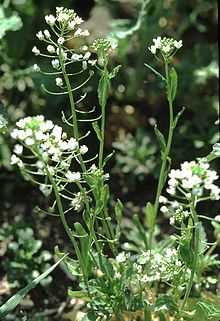Thlaspi arvense
| Thlaspi arvense | |
|---|---|
 | |
| Scientific classification | |
| Kingdom: | Plantae |
| (unranked): | Angiosperms |
| (unranked): | Eudicots |
| (unranked): | Rosids |
| Order: | Brassicales |
| Family: | Brassicaceae |
| Genus: | Thlaspi |
| Species: | T. arvense |
| Binomial name | |
| Thlaspi arvense L. | |
Thlaspi arvense (common name field penny-cress) is a foetid Eurasian plant having round flat pods; naturalized throughout North America. It is also related to the Lepidium species in the cabbage family.
Edible uses
The field pennycress has a bitter taste; it is usually parboiled to remove the bitter taste. This is mostly used in salads, sometimes in sandwich spreads. It is said to have a distinctive flavour.
Use as a source of biodiesel
Pennycress is being developed as an oilseed crop for production of renewable fuels.[1][2] The species can be planted in the fall, will germinate and form a vegetative mass which can overwinter. In the spring, the oil-rich seed can be harvested and used as a biodiesel feedstock.
Research
Pennycress is related to the model plant species Arabidopsis thaliana. Researchers have begun studying the genetics of pennycress in order to improve its potential use as a biofuel crop. For example, the transcriptome of pennycress has been sequenced. [3]

References
- ↑ Arvegenix LLC website
- ↑ Field pennycress shows feedstock potential
- ↑ De novo assembly of the pennycress (Thlaspi arvense) transcriptome provides tools for the development of a winter cover crop and biodiesel feedstock. Kevin M. Dorn, Johnathon D. Fankhauser, Donald L. Wyse, M. David Marks. The Plant Journal. doi:10.1111/tpj.12267